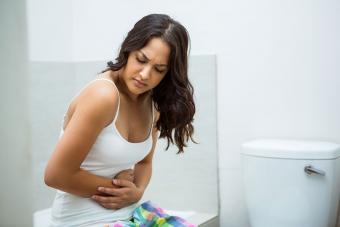
The first sign of pregnancy is usually a missed period, but some people may notice symptoms even before their period is due. Symptoms range from fatigue to mood swings and tender breasts to morning sickness.
Once your period is late, the best way to know if you are pregnant is to take a pregnancy test. If your results are positive, your doctor may confirm your pregnancy via ultrasound during your first prenatal visit.
Common Early Pregnancy Signs and Symptoms
Symptoms of early pregnancy are different for every person and every pregnancy. Some people experience nearly every symptom, and others sail through the first months with only a few (or no) symptoms at all. If you know you are pregnant and have noticed no symptoms of pregnancy, don't worry - it's perfectly normal to be pregnant without experiencing symptoms in the first trimester.
If you've recently found out you are pregnant or are wondering if you are, these are some of the most common signs and symptoms of early pregnancy.
Fatigue
In the first trimester, you may feel more exhausted than usual. Fatigue is one of the most common symptoms in the early weeks of pregnancy. Significant hormonal changes occur during pregnancy, which play a role in how tired you feel. Your body's blood volume also increases during pregnancy, making your heart pump harder and faster to send blood to your growing baby and the developing placenta. The good news is that your energy should improve during the second trimester.
Morning Sickness
Nausea is a common sign of early pregnancy. Some people experience vomiting along with the nausea. This is often called "morning sickness," but that is a bit of a misnomer, since these symptoms can occur any time of the day. Nausea can be unpleasant and uncomfortable, but according to the Mayo Clinic, it may actually be a good sign.
A rise in a hormone called human chorionic gonadotropin (HCG) is thought to play a role in the nausea and vomiting many people experience. Most people will get relief from morning sickness by the end of the first trimester, but some will have nausea throughout their entire pregnancy.
Tender or Swollen Breasts
Sore breasts are usually one of the first signs of pregnancy. Besides feeling more tender than usual, you may notice a tingly sensation in your breasts, and they may feel heavier. A rise in hormones, specifically estrogen and progesterone, causes breast tenderness. According to the Cleveland Clinic, these hormones stimulate the growth of milk ducts to help your breasts prepare for breastfeeding.
Implantation Bleeding
If you notice brownish or pinkish-colored vaginal discharge around the time your period is due, this may be a sign of implantation bleeding. Implantation bleeding occurs when a fertilized egg attaches to the uterine lining. This usually happens about 10-14 days after conception.
Not everyone experiences implantation bleeding, and those that do may mistake it for their period. There are some key differences, though. Implantation bleeding usually lasts for only 1 to 2 days and is much lighter than a normal period.
Increased Basal Body Temperature
If you're trying to conceive, you may track your basal body temperature (BBT) to help predict your most fertile days around the time of ovulation. Your BBT is a measurement of your lowest body temperature when at rest. A sustained rise in your BBT - usually for 18 or more days - may be a sign of pregnancy.
Cervical Mucus Changes
Throughout your menstrual cycle, you may notice fluctuations in your cervical mucus. A rise in the hormone estrogen stimulates the production of cervical mucus. Around the time of ovulation, your body produces more cervical mucus that is stretchy, slippery, and clear. After ovulation, cervical mucus first thickens and then dries up. In early pregnancy, cervical mucus may feel and appear the way it does during ovulation.
Pelvic Cramps or Pain
In the early days of pregnancy, many people experience mild cramps or pain. The pain may feel similar to period cramps. This might feel like sharp pain that comes on suddenly, a constant dull ache, or a combination. According to the Merck Manual, pelvic pain in early pregnancy is normal, and usually occurs as your bones and ligaments shift and stretch to accommodate your growing uterus.
Fortunately, the pain rarely lasts long, but some people may experience ongoing ligament pain as the uterus continues to stretch and grow along with your baby. If your pelvic pain is intense and prevents you from carrying out your normal day-to-day activities, talk to your healthcare provider.
Sensitivity to Certain Smells and Foods
In the early days of pregnancy, you might notice that certain smells - even those you once enjoyed - are now unbearable. A heightened sense of smell is another common pregnancy symptom in the first trimester. The smell of certain foods, and even the foods themselves, may make you feel queasy, gag, or even send you running to the bathroom with another bout of "morning sickness."
In one study, about 75% of pregnant people reported an aversion to certain smells during the first trimester. Coffee, meats, fried foods, body odor, and cigarette smoke were the most common scent aversions, followed by woodlands, perfumes, fruits, and even flowers. Researchers aren't exactly sure why pregnant people smell things more strongly than others, but hormonal fluctuations may play a role.
Food Cravings
Cravings for certain foods is a well-known pregnancy symptom. Though cravings are more common in the second and third trimesters, they you may start yearning for a particular food or foods as early as 5 weeks pregnant.
The most common food cravings during pregnancy are sweets, carbohydrates, animal proteins, and fruits. Fast food, pickles, ice cream, dairy, and chocolate are also common pregnancy cravings. Exactly what causes pregnancy cravings isn't established, but changing nutritional needs and hormonal changes may play a role.
Frequent Urination
Frequent urination, the need to pee more often than usual, seems to be a universal pregnancy experience. As your baby gets bigger in the second and third trimesters, you may spend more time in the bathroom because of the extra weight of your baby and uterus putting pressure on your bladder. But what causes frequent urination in the first trimester? Shortly after implantation, your body produces more blood and fluids, and blood flow to the pelvic region increases, causing frequent urination. Your kidneys also work extra hard to eliminate waste out of your body, which means you'll need to pee more often.
Mood Swings
Feeling like you're on an emotional rollercoaster is a common symptom of early pregnancy. Your moods may swing from elated to angry quickly, and you may cry for no obvious reason. A combination of hormonal changes and the emotional experiences and stresses that come with pregnancy can cause mood swings during pregnancy.
For a more balanced mood, get plenty of rest, eat a healthy diet, and get regular exercise. If you need more help, reach out to a trusted friend, family member, healthcare provider, or consider joining an online pregnancy support group. Knowing you have support can go a long way in helping you feel less alone as you navigate your pregnancy.
Pelvic Pressure and Heaviness
A feeling of heaviness or pressure in the pelvic area can be a sign of early pregnancy. Your uterus may feel heavy as soon as a week after conception. As the pregnancy develops, not only is the uterus growing, but blood flow has increased to the uterus.
During pregnancy, the ovaries and placenta produce a hormone called relaxin. Relaxin loosens the body's muscles, joints, and ligaments to help the body prepare for labor and delivery. Increased levels of relaxin can lead to constipation, which is also common in early pregnancy and may lead to pelvic pressure and bloating.
Later First Trimester Symptoms
In the later weeks of the first trimester, you may notice other symptoms:
- Bloating
- Darkened patches of skin on the face (melasma)
- Greasier skin
- Headache
- Indigestion and heartburn
- Thicker, shinier hair
- Weight gain
Some of these symptoms may go away as you enter the second trimester, while others might stick around until your baby is born.
Pay Attention to Your Signs and Symptoms
When you are pregnant, your body goes through significant hormonal and physiological changes. Some pregnancy symptoms can begin almost immediately after implantation, and others develop as your pregnancy progresses. Early signs and symptoms vary from person to person, so try not to compare your own experience with others'. What's most important is to be aware of what's going on with your body, and talk to your healthcare provider about any concerns you have.







